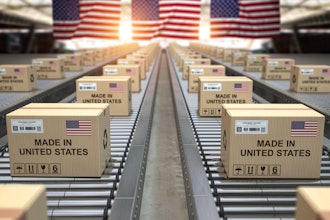
 Paul Robertson
Paul RobertsonManufacturers are a key partner in your business — they’re the ones who convert your design into its final form, meaning they play a large part in whether you bring to market a successful product, or fall short of expectations. The way you go about selecting your manufacturer, and how you invest in building your relationship with them, is crucial.
How can you be sure that the partnership you’re entering will be the right one?
There isn’t a singular description for what a “good” or “bad” manufacturing partnership looks like — it can vary widely across industries and individual companies. A partnership strategy that works well for one company, might create poor outcomes for another company.
What important is to know exactly what you need for your product and what you need out of your manufacturer before starting the relationship, which can be tricky whether you’re a small startup or a large, established company.
Here are a few questions to keep in mind when figuring out which manufacturing partner will work best with your business:
Are They Capable of Doing What I Need?
This seems like a simple question, but many companies fail to look into the minimum threshold of capabilities they need out of a manufacturer, particularly involving equipment and experience. You may need a manufacturer that is capable of doing assembly with a particular component, for example, in which case you might seek out a company that has experience in that specific area.
Engineers often fall into the trap of over-indexing on capabilities and choose manufacturers that can do more than what is needed for them. This may seem like an advantage, but can actually backfire in many ways. If you’re a small startup, for example, and have a low volume of products to produce, a large manufacturer will likely not be the best fit for you, as internal competition within the manufacturer can bump your project down its priorities list. Other costlier and higher demand projects might overshadow you and capture the manufacturer’s time and best engineers, leaving you feeling left on the backburner.
Next, be sure to consider if a manufacturer is capable of any inspections required by your industry’s regulations. If you’re producing FDA-regulated medical devices, using a manufacturer that practices stringent process control, tight inspections and meticulous documentation is a must. In contrast, if you’re producing something like disposable toys, less testing will be required, and as a result, you’ll likely experience much smaller overhead.
Finally, know the level of risk involved with your product and if potential manufacturers are capable of taking on that risk. If you’re a small, aggressive startup, you’ll want a manufacturer that will be comfortable taking on risk and pushing the envelope with you. Multi-million dollar companies, on the other hand, are typically more risk-averse due to the extra precautions they need to take to protect their brand reputation — they’ll want to scout out a partner that can help to drive risk out of the product.
Are There Cultural Differences I Should Be Aware of?
A lot of manufacturers today are located halfway across the world, which can pose challenges when it comes to navigating cultural differences. One way to look at it, is that you’re both playing the same game, but by a completely different set of rules.
In China, for example, where many manufacturers are located, jumping right into business with a company is not the norm. Western companies, which are typically more direct in their manner of doing business, might feel entitled to reach out to a Chinese company to inquire about an immediate working relationship. In China, however, business culture emphasizes guanxi, a construct which describes strong, personal, and trustworthy relationships, so many Chinese companies are hesitant to start something right away with someone that they do not know.
Calling up a Chinese business to directly inquire about the terms of a deal – without dedicating time to building the relationship first – probably won’t get you very far, and Westerners might not understand why if they haven’t educated themselves on those cultural differences. One of the most difficult parts of managing these interactions is that you don’t often realize your own cultural frame of reference; we are just as indoctrinated by our own culture as they are by theirs. To be successful, you have to be able to recognize both and figure out how to play the game by each other’s rules.
What Role Can I Play to Enhance This Partnership?
Many companies put pressure entirely on their enlisted manufacturers to produce a good product, underestimating the role they can play in producing high quality outcomes.
For instance, when evaluating a potential manufacturing partner, if you’re doing most of the talking, you’re probably doing it wrong. Many times I see people making the mistake of asking yes or no questions, which doesn’t give manufacturers the opportunity to fully explain themselves. Instead, asking more open ended questions allows for you to listen to what the manufacturer has to say and allows you to make your best judgement on whether they can provide what you need.
Rather than simply asking, “do you do rigorous incoming quality inspections?”, to which a manufacturer can easily say “yes we do,” despite the fact that they might not, or at least not up to what you define as “rigorous,” ask instead, “what’s your typical incoming quality inspection process like?” By asking questions that aren’t leading, you’re giving the manufacturer the opportunity to answer honestly, rather than saying what they think you want to hear.
It will also be up to you to inform your manufacturer of the standards you expect. One fallacy many product engineers tend to have is that there is an agreed upon standard that manufacturers should be held accountable for. This is simply not true. You need to make clear what you need — from the number of parts to be inspected to each part’s particular dimensions, and other granular details that the manufacture would otherwise be unaware of. If you don’t communicate these needs, they will have no way of knowing your requirements, causing frustration for both parties.
Lastly, treat your manufacturer as an investor in your business. When approaching a manufacturer, show them that you have a viable product, assure them that the people running it know what they are doing, and demonstrate how they will benefit from downstream growth. Treating your manufacturer as a partner, with mutual respect, will go a long way — like any relationship, investing time and effort into your partner will help you get the most out of it.
While choosing a manufacturer for your business can be daunting, knowing what to look for can help all businesses — from startups to large, established brands — produce the best product for their customers.
Paul Robertson is NPI manager at Synapse.























